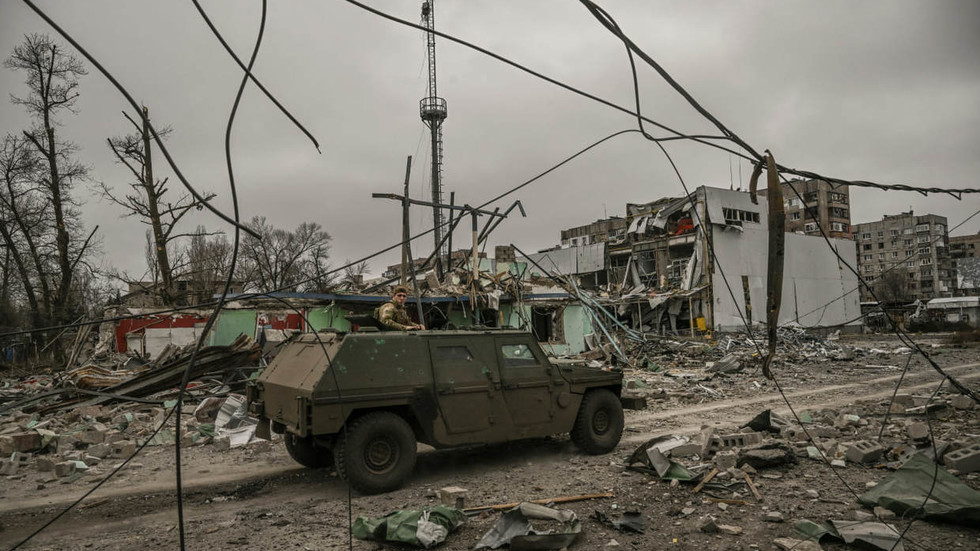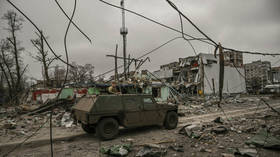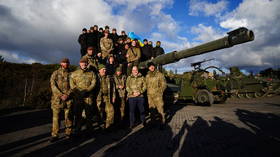
Switzerland struggles to explain how Mowag vehicles got to the front, after photo evidence emerges

A vehicle identified as a Swiss-made Eagle I armored car, photographed in Ukrainian-held Avdeevka, March 18, 2023 © Aris Messinis / AFP
The government in Bern is trying to figure out who violated export control laws after Mowag-made Eagle armored cars were photographed in Ukrainian-held territory, the newspaper Neue Zuercher Zeitung (NZZ) reported on Wednesday.
Switzerland’s War Materiel Act explicitly prohibits re-exports of Swiss-made equipment to anyone involved in armed conflict. Bern is facing immense pressure from the US and its allies to carve out an exemption for Ukraine, and the legislature is currently debating a proposal to do just that.
Against the backdrop of those discussions, the NZZ noted that at least one and maybe two Swiss-made cars had already been delivered to the government in Kiev. One was documented in Chasov Yar, a short distance from the embattled Artyomovsk (known in Ukraine as Bakhmut). Spanish war photographer Jose Colon snapped a picture of the vehicle in the town square and posted it on Instagram in mid-February. The same model was spotted earlier this week by an AFP photographer in Avdeevka, on a different section of the frontline.
The photos clearly show the Eagle I, an armored car made by Mowag in Kreuzlingen. The company is a subsidiary of the US-based General Dynamics Land Systems. The Eagle I was based on the first-generation American Hummvee, and has several distinguishing features that made identification easy – including the back hatch and the side mirrors.

Read more
One possible suspect is Denmark, which bought 36 units in the 1990s and decommissioned them in 2008. The cars lack a machine gun turret, just like the Danish models, which had them removed in 2003. A spokesman for the Danish defense ministry told NZZ that Copenhagen did not send Eagles to Ukraine, however. Rather, 27 of the vehicles were sold to a German company in 2013, with Swiss permission, while the rest were scrapped or sent to museums.
Denmark had sought approval to send 20 Piranha armored vehicles – also made by Mowag – to Ukraine in 2022, but Switzerland said no, citing the War Materiel Act. The Danish government is one of Mowag’s best customers, purchasing over 300 Piranha V and 57 Eagle V vehicles since 2016.
The Swiss State Secretariat for Economic Affairs (Seco) is now looking into whether the German company – which was not named – had violated the ban on re-export. “We will make all the necessary clarifications and assess the situation as quickly as possible,” Seco spokesman Fabian Maienfisch told NZZ.
The US and its allies have sent over $100 billion worth of weapons and ammunition to Ukraine, while insisting they were not a party to the conflict. Washington has been urging Switzerland to join the effort. Its ambassador in Bern, Scott Miller, told NZZ that the re-export ban only benefits “the aggressor.” A parliamentary committee advanced a proposal in January to issue a temporary waiver for EU countries wishing to supply Ukraine. President Alain Berset revealed earlier this month that the amendments to the War Materiel Act had not been approved by the full parliament just yet.
The authors of the proposal claim that it would preserve Switzerland’s neutrality, as these would not be “direct exports.” In the eyes of Russia, however, the Alpine confederacy forfeited that status when it joined the EU sanctions against Moscow last year.




